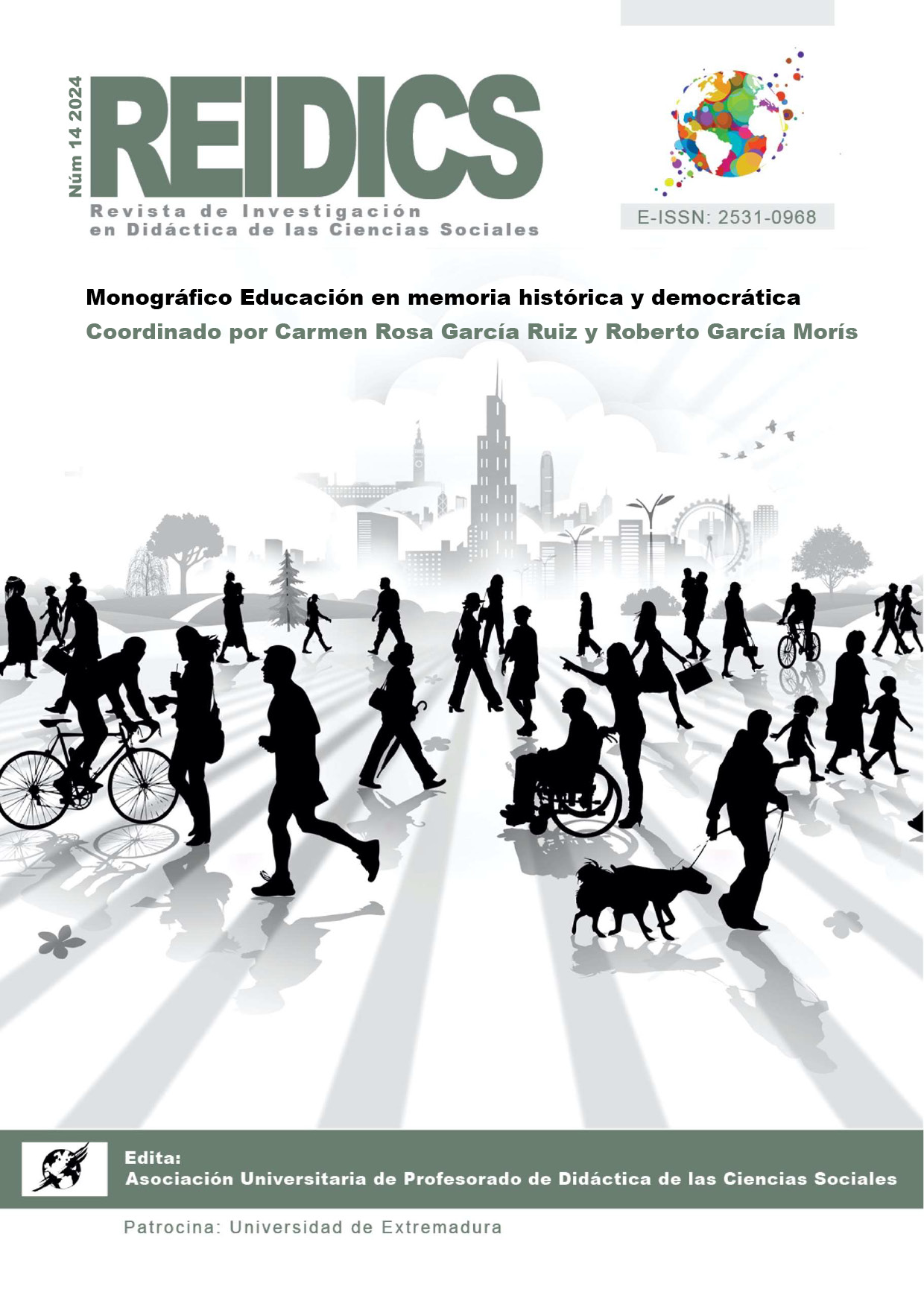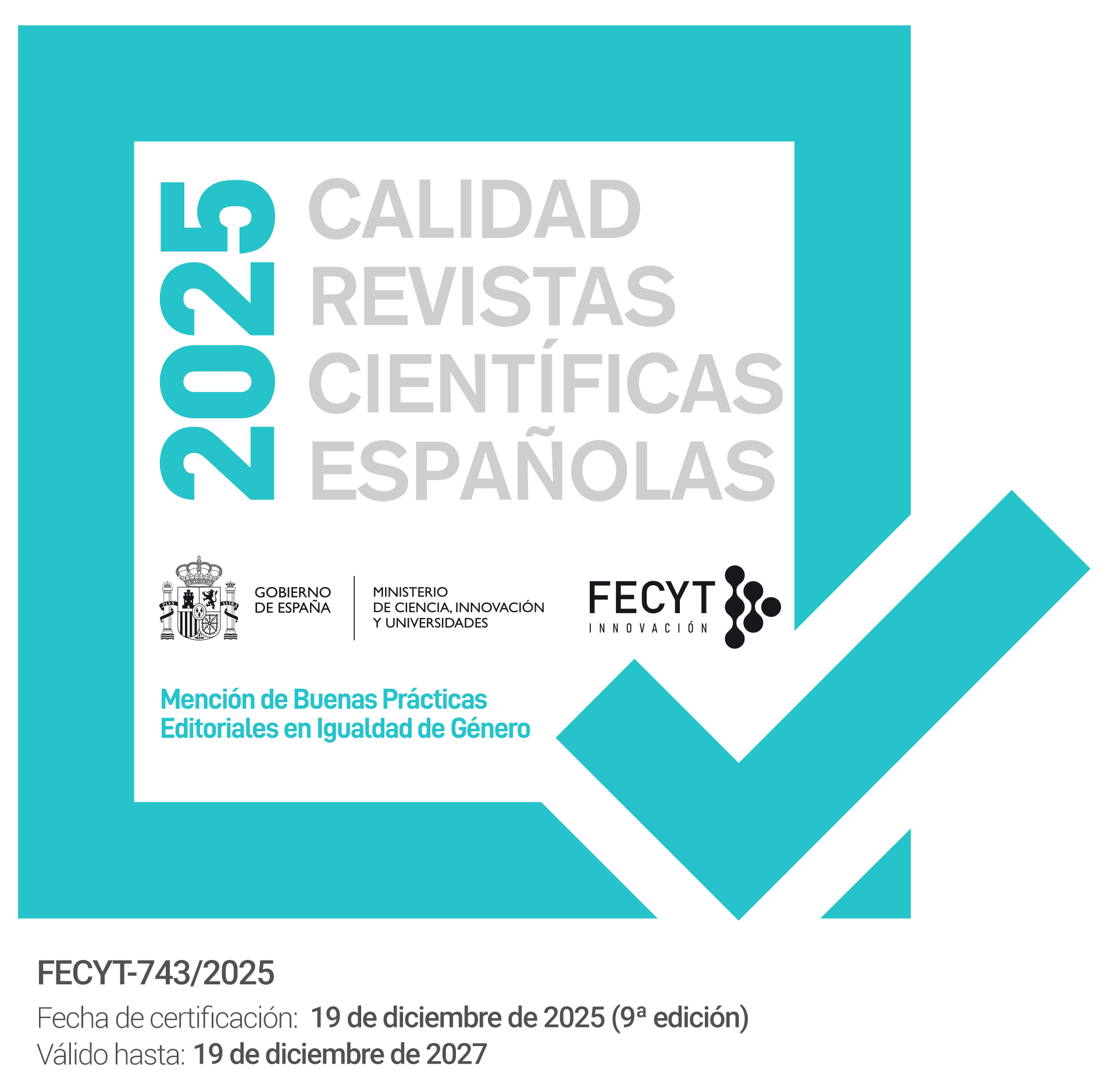Analysis of students' citizenship actions when studying the Chilean civil military dictatorship
DOI:
https://doi.org/10.17398/2531-0968.14.03Keywords:
difficult history; high school students; Chilean civil military dictatorship; citizenship education; democracy; human rightsAbstract
Various measurements on the civic values of young Chileans have shown their inclination to justify dictatorships in the case of offering order, security or economic benefits, in addition to the validation of violence to resolve conflicts. Considering this background, the purpose of this article is to analyze the citizenship actions that students develop in the present and project in the future to protect democracy and human rights during the study of the Chilean dictatorship, based on a wide variety of historical documents. This is an exploratory qualitative research that analyzes, from the methodology of content analysis, 70 answers developed by 35 students belonging to two high school classes of a private school in Santiago, Chile. The results show that the students consider themselves in the present and project themselves in the future as active citizens committed to democracy and human rights. Thus, actions such as valuing the vote, listening to those who think differently, staying informed, participating in demonstrations, respecting others and learning from the past are the most relevant for the participants. In spite of the above, the responses of the young people also show that they avoid conflict and understand their exercise of citizenship as part of their individual personal development, in addition to showing little knowledge about institutions, civil organizations and the multiple forms of political action that people can develop.
References
Soto, A., y Jiménez, M. (2022). El rol de las narraciones autobiográficas en la comprensión histórica del sujeto y su comunidad. REIDICS. Revista De Investigación en Didáctica De Las Ciencias Sociales, (11), 118-134. https://doi.org/10.17398/2531-0968.11.118
Agencia de Calidad de la Educación. (2018). Primer Estudio Nacional Formación Ciudadana, Octavo básico. Santiago de Chile.
Barton, K. (2015). Young adolescents’ positioning of human rights: Findings from Colombia, Northern Ireland, Republic of Ireland and the United States. Research in Comparative and International Education, 10(1), 48–70. https://doi.org/10.1177/174549991456
Barton, K. (2018). Historical Sources In The Classroom: Purpose and Use. HSSE Online, 7(2) 1-11.
Barton, K. (2019). What Should We Teach about Human Rights? Implications of International Research. Social Education, 83(4), 212-216.
Barton, K. (2020). Students’ Understanding of Institutional Practices: The Missing Dimension in Human Rights Education. American Educational Research Journal, 57(1), 188–217. https://doi.org/10.3102/0002831219849
Barton, K., y Levstik, L. (2004). Teaching History for the Common Good. Taylor & Francis.
Barton, K., y McCully, A. (2010). “You Can Form Your Own Point of View”: Internally Persuasive Discourse in Northern Ireland Students´ Encounters with History. Teachers College Record, 112 (1), 142-181. https://www.tcrecord.org/Content.asp?ContentId=15801
Bermudez, A. (2019). The normalization of political violence in history textbooks: Ten narrative keys. Dialogues on Historical Justice and Memory Network Working Paper Series, 15, 1–22.
Biesta , G., y Lawy, R. (2006). From teaching citizenship to learning democracy. Overcoming individualism in research, policy and practice. Cambridge Journal of Education, 36 (1), 63-79. https://doi.org/10.1080/03057640500490981
Britzman, D. (1998). Los Subjects, Contested Objects. Toward a Psychoanalytic Inquiry Learning. State University of New York Press.
Catela, L. (2002). El mundo de los archivos. En L. Catela y E. Jelin (Comps.), Los archivos de la represión: documentos, memoria y verdad (pp.195-221). Siglo XXI editores.
CERC-MORI (2023). Chile a la sombra de Pinochet. La opinión pública sobre la “Era de Pinochet” 1973-2023. Barómetro de la política. http://morichile.cl/barometro-de-la-politica-cerc-mori-1987-2023/
Denzin, N., y Lincoln, Y. (2013). Las estrategias de investigación cualitativa. Gedisa Editorial.
Epstein, T., y Peck, C. (2018). Introduction. En T. Epstein y C. Peck (Eds), Teaching and Learning Difficult Histories in International Contexts. A Critical Sociocultural Approach (pp. 1-15). Routledge.
Flick, U. (2004). Introducción a la Investigación Cualitativa. Ediciones Morata.
García, C. (2017). Los desafíos de la educación ciudadana en Chile. Una aproximación comprensiva desde las significaciones pedagógicas de los profesores de Historia. Enseñanza de las ciencias sociales: revista de investigación,16,115- 126. https://raco.cat/index.php/EnsenanzaCS/article/view/334522.
Garrett, J. (2017). Learning to be in the world with others: Difficult knowledge & social studies education. Peter Lang.
Garrett, J. (2011). The Routing and Re-Routing of Difficult Knowledge: Social Studies Teachers Encounter When the Levees Broke. Theory & Research in Social Education, 39 (3), 320-347. https://doi.org/10.1080/00933104.2011.10473458
Garrett, J., y Schmidt, S. (2012). Repeating Until We Can Remember: Difficult (Public) Knowledge in South Africa. Journal of Curriculum Theorizing, 28 (1), 191-206.
Gibbs, G. (2012). El análisis de datos cualitativos en investigación cualitativa. Ediciones Morata.
Goldberg, T. (2017). Between Trauma and Perpetration: Psychoanalytical and Social Psychological Perspectives on Difficult Histories in the Israeli Context. Theory & Research in Social Education, 45 (3), 349-377. https://doi.org/10.1080/00933104.2016.1270866
Goldberg, T. (2020). Delving into Difficulty: Are Teachers Evading or Embracing Difficult Histories?. Social Education, 84 (2), 130-136.
Gross, M., y Terra, L. (2018). Introduction: What Makes Difficult History Difficult? En M. Gross y L. Terra (Eds), Teaching and Learning the Difficult Past (pp.1-8). Routledge.
Jelin, E. (2002). Los trabajos de la memoria. Siglo XXI editores.
Jelin, E. (2017). La lucha por el pasado. Cómo construimos la memoria social. Siglo XXI editores.
Krippendorf, K. (1990). Metodología de análisis de contenido. Teoría y Práctica. Paidós Comunicación.
Lévesque, S. (2009). Thinking Historically: Educating Students for the 21st Century. University of Toronto Press.
Miles, J. (2019). Seeing and feeling difficult history: A case study of how Canadian students make sense of photographs of Indian Residential Schools. Theory & Research in Social Education, 47 (4), 472-496. https://doi.org/10.1080/00933104.2019.1626783
Ministerio de Educación de Chile. (2016). Historia, Geografía y Ciencias Sociales. Programa de Estudio Segundo Medio. Ministerio de Educación de Chile.
Muñoz, C., y Torres, B. (2014). La formación ciudadana en la escuela: Problemas y desafíos. Revista Electrónica Educare, 18(2), 233-245. http://dx.doi.org/10.15359/ree.18-2.12
Nordgren, K. (2016). How to Do Things with History: Use of History as a Link Between Historical Consciousness and Historical Culture. Theory & Research in Social Studies, 44 (4). 479-504. https://doi.org/10.1080/00933104.2016.1211046.
Pagès, J., y Marolla, J. (2018). La historia reciente en los currículos escolares de Argentina, Chile y Colombia. Desafíos de la educación para la ciudadanía desde la Didáctica de las Ciencias Sociales. Historia Y Memoria, 17, 153–184. https://doi.org/10.19053/20275137.n17.2018.7455
Pulso Ciudadano (2023). Pulso Ciudadano, 50 años del Golpe de Estado en Chile. https://chile.activasite.com/estudios/pulso-ciudadano-69/ .
Schulz, W., Ainley J., Cox C., y Friedman, T. (2016). Percepciones de los jóvenes acerca del gobierno, la convivencia pacífica y la diversidad en cinco países de América Latina. Estudio Internacional sobre Educación Cívica y Ciudadana 2016 de la IEA Informe Lationamericano. Asociación Internacional para la Evaluación del Logro Educativo.
Seixas, P., y Morton, T. (2013). The Big Six Historical Thinking Concepts. Nelson.
Sheppard, M., y Levy, S. (2019). Emotions and teacher decision-making: An analysis of social studies teachers´ perspectives. Teaching and Teacher Education, 77, 193-203.
Simon, R. (2004). The Pedagogical Insistence of Public Memory . En P. Seixas (Ed.), Theorizing Historical Consciousness (pp. 183-201). University of Toronto Press.
Simon, R. (2006) The terrible gift: Museums and the possibility of hope without consolation. Museum Management and Curatorship, 21(3), 187-204. https://doi.org/10.1080/09647770600202103.
Simon, R. (2011). A shock to thought: Curatorial judgment and the public exhibition of ‘difficult knowledge.’ Memory Studies. 4 (4), 432-449. https://doi.org/10.1177/1750698011398170.
Simon, R., y Eppert, C. (2005). Remembering Obligation: Pedagogy and the Witnessing of Testimony of Historical Trauma. En R. Simon (Ed.), The Touch of the Past: Remembrance, Learning and Ethics (pp. 50-64). Palgrave Macmillan.
Soto, A. (2023). Tendiendo puentes didácticos entre las narrativas autobiográficas, el pensamiento histórico disciplinar y los procesos de subjetivación: una propuesta teórica. REXE- Revista De Estudios Y Experiencias en Educación, 22(48), 327–343. https://doi.org/10.21703/0718-5162.v22.n48.2023.019.
Soto, A., y Jiménez, M. (2023). La dictadura civil militar chilena (1973-1990) como una experiencia afectiva en el contexto educativo: potencialidades y desafíos didácticos. Clío & Asociados. La Historia enseñada, 36, e0014. https://doi.org/10.14409/cya.2023.36.e0014 .
Soto, A., y Jiménez, M. (2024). Consideraciones del alumnado sobre las acciones de resistencia durante la dictadura chilena desde la dimensión ética del pensamiento histórico. Perspectivas, (28), 1-28. https://www.revistas.una.ac.cr/index.php/perspectivas/article/view/19567 .
Stake, R. (2013). Estudio de casos cualitativos. En N. Denzin y Y. Lincoln (Coords.), Las estrategias de investigación cualitativa (pp 154-197). Gedisa Editorial.
Strauss, A., y Corbin, J. (2002). Bases de la Investigación Cualitativa. Técnicas y Procedimientos para Desarrollar la Teoría Fundamentada. Editorial Universidad de Antioquia.
Strauss, A., y Corbin, J. (2002). Bases de la investigación cualitativa. Técnicas y procedimientos para desarrollar la teoría fundamentada. Universidad de Antioquia.
Toledo, M., y Gazmuri, R. (2009). Obedientes, memoriones o reflexivos pensantes: Tensiones entre objetivos identitarios y cognitivos en enseñanza de la historia reciente de Chile en 6º año de enseñanza básica. Estudios pedagógicos, 35(2), 155-172. http://dx.doi.org/10.4067/S0718-07052009000200009
Toledo, M., y Magendzo, A. (2013). Golpe de Estado y Dictadura Militar: Estudio de un Caso Único de la Enseñanza de un Tema Controversial en un Sexto Año Básico de un Colegio Privado de la Región Metropolitana - Santiago, Chile. Psykhe, 22(2), 147-160. http://dx.doi.org/10.7764/psykhe.22.2.585
Townsend, B., y López, L. (2017). Guía de Archivos de Memoria y Derechos Humanos en Chile. Universidad Alberto Hurtado.
Westheimer, J., y Kahne, J. (2004). What Kind of Citizen? The Politics of Educating for Democracy. American Educational Research Journal, 41(2), 237-269. https://doi.org/10.3102/0002831204100
Zembylas, M. (2014). Theorizing “Difficult Knowledge” in the Aftermath of the “Affective Turn”: Implications for Curriculum and Pedagogy in Handling Traumatic Representations. Curriculum Inquiry, 44(3), 390-412. https://doi.org/10.1111/curi.12051 .
Zembylas, M., Lesta, S., Charalambous, C., y Charalambous, P. (2016). Toward a Critical Hermeneutical Approach in Human Rights Education: Transformative Possibilities and the Challenges of Implementation. European Education, 48(2), 137-157. https://doi.org/10.1080/10564934.2016.1202030
Zembylas, M., y Kambani, F. (2012) The Teaching of Controversial Issues During Elementary-Level History Instruction: Greek-Cypriot Teachers' Perceptions and Emotions. Theory & Research in Social Education, 40 (2), 107-133. https://doi.org/10.1080/00933104.2012.670591
Downloads
Published
Issue
Section
License
Copyright (c) 2024 Andres Soto Yonhson, María Soledad Jiménez

This work is licensed under a Creative Commons Attribution-NonCommercial-ShareAlike 4.0 International License.
Aquellos autores/as que tengan publicaciones con esta revista, aceptan los términos siguientes:
- Los autores/as conservarán sus derechos de autoría y garantizarán a la revista el derecho de primera publicación de su obra, el cual estará simultáneamente sujeto a la Licencia de reconocimiento de Creative Commons 4.0 BY-NC-SA que permite a terceros compartir la obra siempre que se indique su autor y su primera publicación en esta revista.
- Los autores/as podrán adoptar otros acuerdos de licencia no exclusiva de distribución de la versión de la obra publicada (p. ej.: depositarla en un archivo telemático institucional o publicarla en un volumen monográfico) siempre que se indique la publicación inicial en esta revista.
- Se permite y recomienda a los autores/as difundir su obra a través de Internet (p. ej.: en archivos telemáticos institucionales o en su página web) antes y durante el proceso de envío, lo cual puede producir intercambios interesantes y aumentar las citas de la obra publicada. (Véase El efecto del acceso abierto).
- Los autores y autoras han respetado la política de autoría de esta revista.








